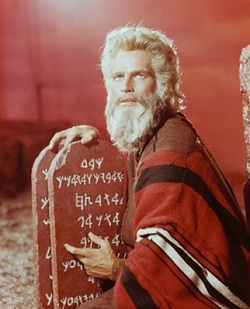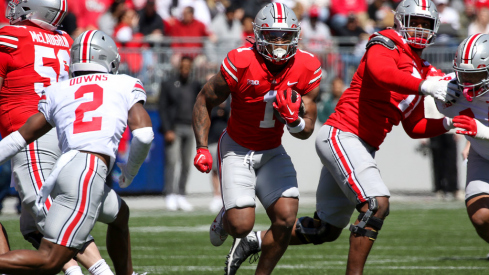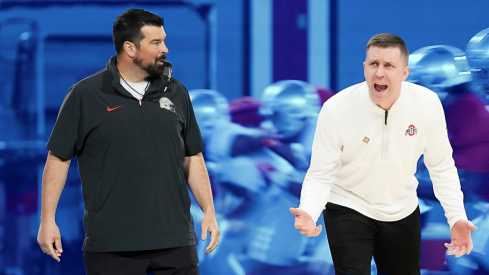 Thou Shalt Not...
Thou Shalt Not...It's the off-season and as thoughts turn to playing golf and gardening all over Columbus, we continue to be hit with news about college football's shady side. Since the BSU faithful have probably had a few good laughs at OSU's expense over the past few weeks, it's somewhat satisfying to see them accused of "lack of institutional control" by the NCAA. Still, looking over the allegations, it causes my objective side to ask "is this really all that bad?"
Boise State president Bob Kustra called the violations a "misunderstanding", and while a certain amount of skepticism must accompany that comment, I have a bit of sympathy. After all, my favorite football program is currently being put through the NCAA grinder and the full consequences won't be revealed for some time. I'm not quite ready to go Bosworth about the whole thing, but I have to admit that the byzantine NCAA rulebook sometimes leaves me baffled.
It is not difficult to understand some of these investigations. For example, the Colorado stripper scandal back in 2004 was a no-brainer. It does not take a legal expert or a compliance officer to know that a college cannot hire strippers to help with football recruiting. And receiving benefits from a potential agent seems like an obvious no-no. But it's not always that easy.
Going over all of this in my mind, I thought that I would try to see the logic in all of these rules and apply some kind of moral standard to it. Why is it bad to give room and board to a recruit on a visit? Why is it bad to sell memorabilia or trade it for services? What about other things that are not violations but smack of cheating or "gaming the system"? Is obeying the letter of the law while doing everything to win good enough, or should there be some higher goal that a program should shoot for?
Let's start with the idea of paying players, and giving benefits in general. Over the years, many pundits have tried to make the case for paying college football players, some more cogent than others. The moral argument here is that the players put out a tremendous amount of effort and everyone seems to make money on that effort except them. It almost sounds like a form of slavery. On the other hand, a pay-for-play scheme would surely favor the bigger schools (like OSU) over the smaller ones and this would conflict with the idea that the playing field should be level. Currently, the sportsmanship ideal is still winning out over the moral argument. It may not always be that way, but I think the college game is ultimately better for it.
Speaking of sportsmanship, there is one area where this ideal seems to be losing out, and that is in the area of rankings and the decision of who goes to bowl games, especially the BCS Championship game. I have felt strongly about this for the past few years, especially in 2008 when Oklahoma finished the regular season ranked #1 mostly because everyone was so impressed with how many points they scored. The fact that Bob Stoops relentlessly ran up the score on nearly every opponent that season was sometimes mentioned but usually dismissed as just petty jealousy. This was even more grating when Ohio State was accused of running it up against Northwestern because the 'Cats couldn't stop a late-game running play when OSU was trying to kill the clock. Obviously, there is no rule against scoring a lot of points, and the NCAA has no authority over slack-jawed poll voters who drool when they see a 62-21 win over Missouri in a conference championship game. It is just as obvious that this example of bad sportsmanship gives the less charitable programs an advantage over the more classy ones.
Another advantage would be extra practice time, and some schools have been caught trying to squeeze a little more from their players than the NCAA rulebook allows. This is also on the list of accusations against Boise State. The moral argument is that the NCAA has to draw the line somewhere, because these guys are supposed to be students. Besides, even the NFL has rules regarding team practice time over the summer. Making sure that every team does it the same way makes the game fair for everyone, and so sportsmanship is also on the side of these rules.
The issue gets a little dicey when we begin to talk about benefits that do not come directly from the university. The OSU "Tat-gate" scandal has been compared to the A.J. Green agent scandal, but I'm not sure the comparison is valid. In the case of Green, the university was not penalized as far as I know (please correct me if I missed this) other than not having his services on the field for 4 games. This makes sense, because getting money from a potential agent means that the player is no longer an amateur and thus is ineligible to play the college game. Now try the same logic in the case of the Tat-5. It doesn't work because their benefits did not come from an agent, not even a potential one. They did violate rules, and I have no problem with whatever penalty the NCAA levies, but I wonder if there is any moral basis for the rule in the first place. I don't think there is, and I also don't think it conflicts with the ideal of good sportsmanship.
I understand that a rule is a rule, and it applies to everyone. But why does the rule exist in the first place? The argument that I've heard is that a football player at a place like OSU has an opportunity to accumulate these trinkets solely because of his association with the university's athletic program, and this is a benefit that not all students have. To that I say "so what?" Does college football really benefit from preventing these types of transactions? I suppose it's possible that if it is allowed to continue, some schools will start issuing trophies and plaques for every good play, every practice session, every look of enthusiasm a player shows, etc. and that this will constitute extra benefits. That argument makes some sense to me because it goes back to the issue of paying players. Still, that scenario seems unlikely to me and it sounds like just another overreach by the NCAA.
All this leads to one final question that has been on my mind: is college football more "shady" today than it was 20-30 years ago? Or are we just finding out more because of the internet and sites like Facebook and Twitter? Does the ideal of sportsmanship even exist in college football anymore? I'd be interested in hearing your thoughts on this. I'd also like to know if you think I'm being too casual about some of this stuff.

